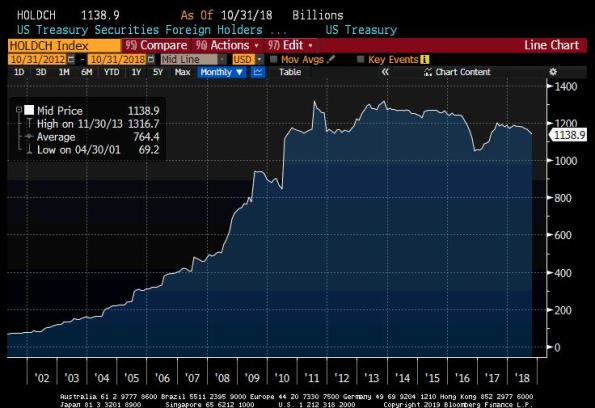The rumor on Friday was that China is going to resolve the trade standoff by agreeing to balance its trade with the U.S. by buying a trillion dollars of goods and services over the next four years. The Administration, so the rumor goes, is holding out for two years since that will look better for the election. They should agree to four, because otherwise they’re going to have to explain why it’s not working.
I ascribe approximately a 10% chance that the trade balance with China will be at zero in four years. (I’m adjusting for overconfidence bias, since I think the real probability is approximately zero.) But if it does happen, it is very bad for our financial markets. Here’s why.
If China buys an extra trillion dollars’ worth of U.S. product, where do they get the dollars to do so? There are only a few options:
- They can sell us a lot more stuff, for which they take in dollars. But that doesn’t solve the trade deficit.
- They can buy dollars from other dollar-holders who want yuan, weakening the yuan and strengthening the dollar, making U.S. product less competitive and Chinese product more competitive globally. This means our trade deficit with China would be replaced by trade deficits with other countries, again not really solving the problem.
- They can use the dollars that they are otherwise using to buy financial securities denominated in dollars, such as our stocks and bonds.
The reality is that it is really hard to make a trade deficit go away. Blame the accountants, but this equation must balance:
Budget deficit = trade deficit + domestic savings
If the budget deficit is very large, which it is, then it must be financed either by running a trade deficit – buying more goods and services from other countries than they buy from us, stuffing them with dollars that they have no choice but to recycle into financial assets – or by increased domestic savings.
So, let’s play this out and think about where the $500bln per year (the U.S. trade deficit, roughly, with the rest of the world) is going to come from. With the Democrats in charge of Congress and an Administration that is liberal on spending matters, it seems to me unlikely that we will see an abrupt move into budget balance, especially with global growth slowing. The other option is to induce more domestic savings, which reduces domestic consumption (and incidentally, that’s a counterbalance to the stimulative growth effect of an improving trade balance). But the Fed is no longer helping us out by “saving” huge amounts – in fact, they are dis-saving. Inducing higher domestic savings would require higher market interest rates.
The mechanism is pretty clear, right? China currently holds roughly $1.1 trillion in U.S. Treasury securities (see chart, source U.S. Treasury via Bloomberg).

China also holds, collectively, lots of other things: common equities, corporate bonds, private equity, U.S. real estate, commodities, cash balances. Somewhere in there, they’ll need to divest about a trillion dollars’ worth to get a trillion dollars to buy U.S. product with.
The effect of such a trade-balancing deal would obviously be salutatory for U.S. corporate earnings, which is why the stock market is so ebullient. But it would be bad for U.S. interest rates, and bad for earnings multiples. One of the reasons that financial assets are so expensive is that we are force-feeding dollars to non-U.S. entities. To the extent that we take away that financial inflow by balancing trade and budget deficits, we lower earnings multiples and raise interest rates. This also has the effect of inducing further domestic savings. Is this good or bad? In the long run, I feel reasonably confident that having lower multiples and more-balanced budget and trade arrangements is better, since it lowers a source of economic leverage that also (by the way) tends to increase the frequency and severity of financial crack-ups. But in the short run…meaning over the next few years, if China is really going to work hard to balance the trade deficit with the U.S.…it means rough sledding.
As I said, I give this next-to-no chance of China actually balancing its trade deficit with us. But it’s important to realize that steps in that direction have offsetting effects that are not all good.
